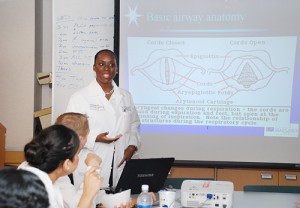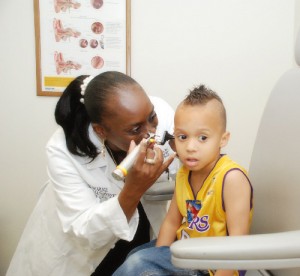- New Sublingual Allergy Tablets - October 31, 2014
- Ground-breaking New Treatment Option for Sleep Apnea - September 27, 2014
- Allergies versus Viruses in Children - September 27, 2014
- “Dog Dust” Protects Children from Allergies - September 27, 2014
- Nasal Saline Irrigation - August 8, 2014
- Doctor, I am Allergic to Dust. What Can I do? - July 31, 2014
- Infants Exposed to Dust Mites Less Likely to Develop Allergies - June 23, 2014
- How to Treat a Young Child’s Cough - December 17, 2013
- Many Parents are Unaware That Their Children Are at Risk for Noise Induced Hearing Loss - December 9, 2013
- Is it a Cold or an Ear Infection? - December 9, 2013
How can I help my child lose weight in a healthy way?
We went for my three year old son’s annual physical and his weight falls above the 90th percentile. The pediatrician has ordered a blood test to check his cholesterol. We thought it was just baby fat but now I am concerned. We don’t want to institute a diet or make him feel uncomfortable about food or his weight. Are there safe ways to help my child get healthy?

Discussion:
Whether you blame it on our sedentary, technology-driven world, fast food, or any other issue, the rate of childhood obesity is alarming. 1 in 3 children in the US is now overweight or obese. The childhood obesity rate has doubled since the 1980’s.
This is a major concern because obese children are at a higher risk for developing chronic medical conditions including:
- Diabetes
- Heart Disease
- High Blood Pressure
- High Cholesterol
- Low Self Esteem/Depression
- Reactive Airway Disease/Asthma
- Sleep Apnea
 Often, an obese child develops a medical problem which makes them more likely to get other disease. For example, an overweight child may develop sleep apnea which makes them at higher risk for developing high blood pressure.
Often, an obese child develops a medical problem which makes them more likely to get other disease. For example, an overweight child may develop sleep apnea which makes them at higher risk for developing high blood pressure.
Among the many reasons for childhood obesity are: High calorie, low nutrition snacks
- High sugar beverages such as soda and juice
- Decreased activity
- Too much screen time (TV, computers, video games, smart phones)
It is important to take an active role in your child’s health without making them feel judged. One of the most important steps is to assess your child’s risk of medical problems.
Sleep apnea is a significant health risk for your child. If your child snores, or is unable to breathe comfortably at night, this may suggest they have sleep apnea. Consultation with a pediatric otolaryngologist is critical to assess your child’s risk and help institute treatment.
Other important steps include:
- Improve the diet and habits of the entire family.
- Eat dinner together as often as possible
- Limit TV time to less than 2 hours per day
- Play together as a family
 This can include taking a family walk around the block, riding bikes, playing ball in the back yard or just dancing around the living room to music. Just 20 minutes of any of these activities will put your child on the path to success and will help your family bond.
This can include taking a family walk around the block, riding bikes, playing ball in the back yard or just dancing around the living room to music. Just 20 minutes of any of these activities will put your child on the path to success and will help your family bond.
Start with simple steps to encourage a healthier life style not only for your child but also for your whole family.
Key Points:
- Childhood obesity is on the rise and is a significant health risk for your child.
- Sleep apnea is one of the complications of obesity that pose a serious threat to your child’s health. Seek evaluation by a pediatric otolaryngologist to rule this out.
- Eating and playing together as a family helps the whole family become closer and healthier.



